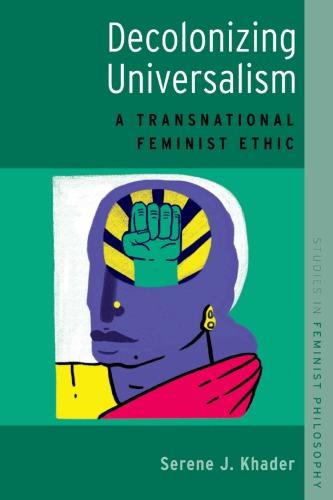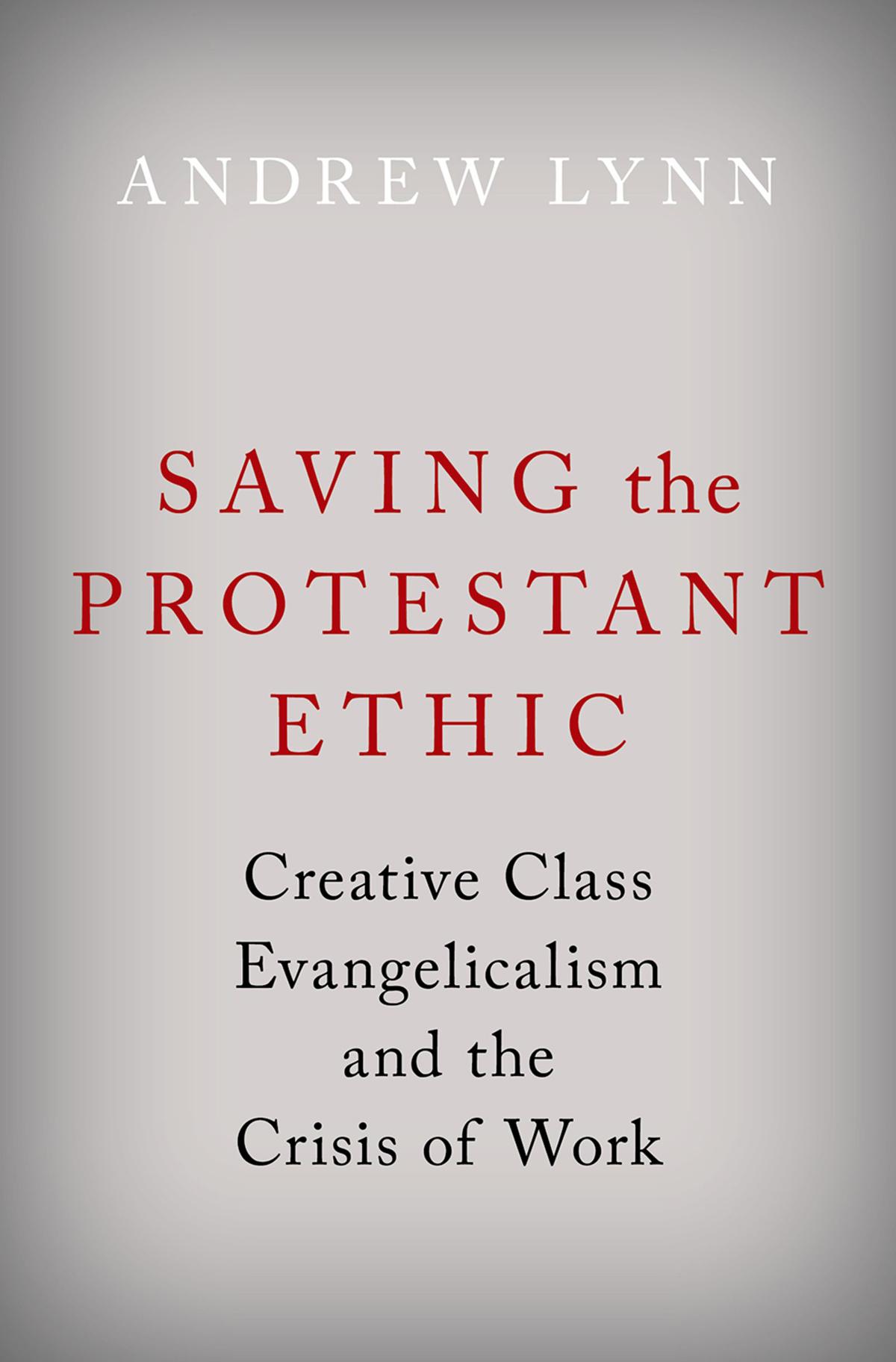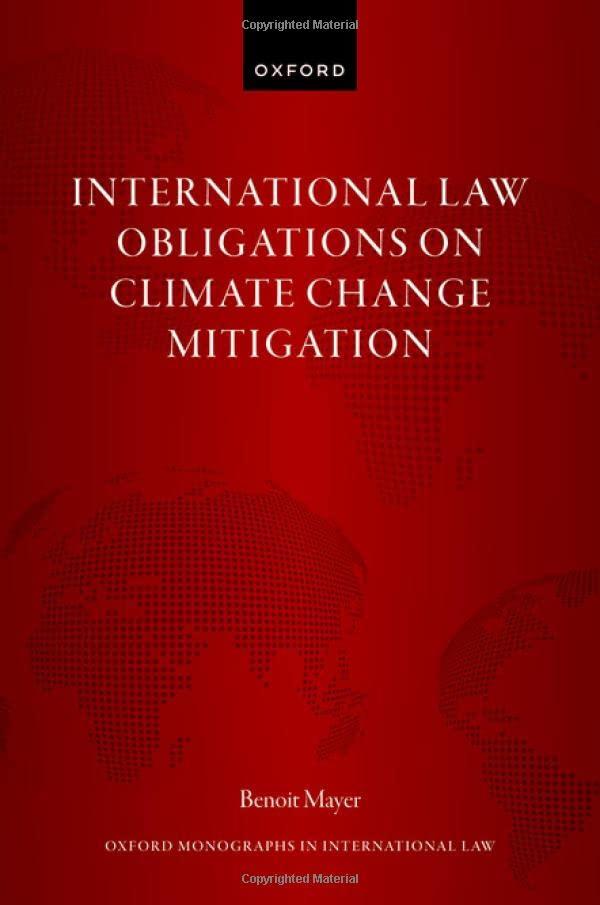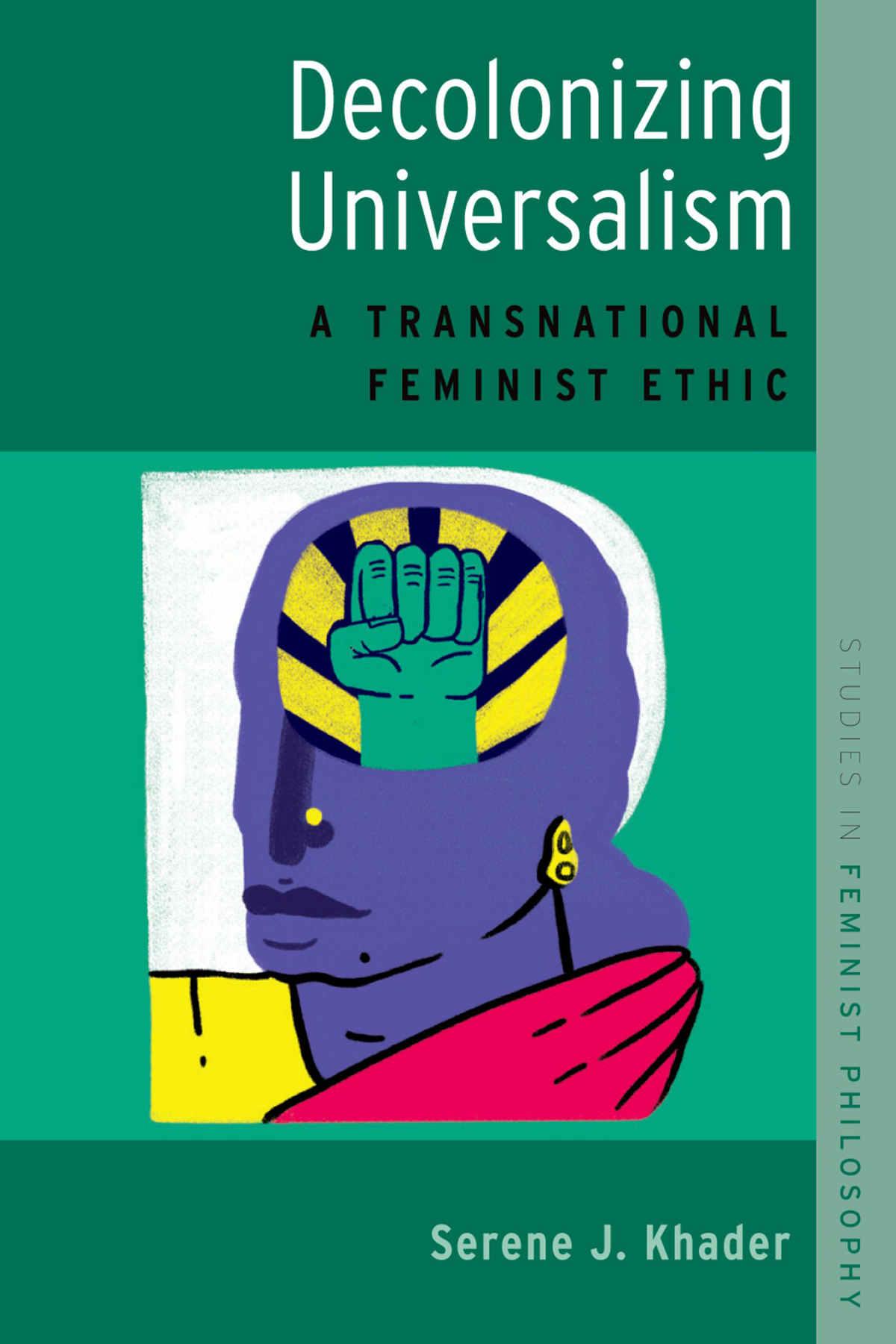DECOLONIZING UNIVERSALISM
Studies in Feminist Philosophy is designed to showcase cutting-edge monographs and collections that display the full range of feminist approaches to philosophy, that push feminist thought in important new directions, and that display the outstanding quality of feminist philosophical thought.
STUDIES IN FEMINIST PHILOSOPHY
Linda Martín Alcoff, Hunter College and the CUNY
Graduate Center
Elizabeth Barnes, University of Virginia
Lorraine Code, York University, Toronto
Penelope Deutscher, Northwestern University
Ann Garry, California State University, Los Angeles
Sally Haslanger, Massachusetts Institute of Technology
Alison Jaggar, University of Colorado, Boulder
Serene J. Khader, Brooklyn College and CUNY Graduate Center
Helen Longino, Stanford University
Catriona Mackenzie, Macquarie University
Mari Mikkola, Humboldt University, Berlin
Sally Scholz, Villanova University
Laurie Shrage, Florida International University
Lisa Tessman, Binghamton University
Nancy Tuana, Pennsylvania State University
Published in the Series:
Setting the Moral Compass: Essays by Women Philosophers
Edited by Cheshire Calhoun
Visible Identities: Race, Gender and the Self
Linda Martín Alcoff
Women and Citizenship
Edited by Marilyn Friedman
Women’s Liberation and the Sublime: Feminism, Postmodernism, Environment
Bonnie Mann
Analyzing Oppression
Ann E. Cudd
Ecological Thinking: The Politics of Epistemic Location
Lorraine Code
Self Transformations: Foucault, Ethics, and Normalized Bodies
Cressida J. Heyes
Family Bonds: Genealogies of Race and Gender
Ellen K. Feder
Moral Understandings: A Feminist Study in Ethics, Second Edition
Margaret Urban Walker
The Moral Skeptic
Anita M. Superson
“You’ve Changed”: Sex Reassignment and Personal Identity
Edited by Laurie J. Shrage
Dancing with Iris: The Philosophy of Iris Marion Young
Edited by Ann Ferguson and Mechthild Nagel
Philosophy of Science after Feminism
Janet A. Kourany
Shifting Ground: Knowledge and Reality, Transgression and Trustworthiness
Naomi Scheman
The Metaphysics of Gender
Charlotte Witt
Unpopular Privacy: What Must We Hide?
Anita L. Allen
Adaptive Preferences and Women’s Empowerment
Serene J. Khader
Minimizing Marriage: Marriage, Morality, and the Law
Elizabeth Brake
Out from the Shadows: Analytic Feminist Contributions to Traditional Philosophy
Edited by Sharon L. Crasnow and Anita M. Superson
The Epistemology of Resistance: Gender and Racial Oppression, Epistemic Injustice, and Resistant Imaginations
José Medina
Simone de Beauvoir and the Politics of Ambiguity
Sonia Kruks
Identities and Freedom: Feminist Theory Between Power and Connection
Allison Weir
Vulnerability: New Essays in Ethics and Feminist Philosophy
Edited by Catriona Mackenzie, Wendy Rogers, and Susan Dodds
Sovereign Masculinity: Gender Lessons from the War on Terror
Bonnie Mann
Autonomy, Oppression, and Gender
Edited by Andrea Veltman and Mark Piper
Our Faithfulness to the Past: The Ethics and Politics of Memory
Sue Campbell
Edited by Christine M. Koggel and Rockney Jacobsen
The Physiology of Sexist and Racist Oppression
Shannon Sullivan
Disorientation and Moral Life
Ami Harbin
The Wrong of Injustice: Dehumanization and its Role in Feminist Philosophy
Mari Mikkola
Beyond Speech: Pornography and Analytic Feminist Philosophy
Mari Mikkola
Differences: Rereading Beauvoir and Irigaray
Edited by Emily Anne Parker and Anne van Leeuwen
Categories We Live By: The Construction of Sex, Gender, Race, and Other Social Categories
Ásta
Equal Citizenship and Public Reason: A Feminist Political Liberalism
Christie Hartley and Lori Watson
Decolonizing Universalism: A Transnational Feminist Ethic
Serene J. Khader
1
Oxford University Press is a department of the University of Oxford. It furthers the University’s objective of excellence in research, scholarship, and education by publishing worldwide. Oxford is a registered trade mark of Oxford University Press in the UK and certain other countries.
Published in the United States of America by Oxford University Press 198 Madison Avenue, New York, NY 10016, United States of America.
© Oxford University Press 2019
All rights reserved. No part of this publication may be reproduced, stored in a retrieval system, or transmitted, in any form or by any means, without the prior permission in writing of Oxford University Press, or as expressly permitted by law, by license, or under terms agreed with the appropriate reproduction rights organization. Inquiries concerning reproduction outside the scope of the above should be sent to the Rights Department, Oxford University Press, at the address above.
You must not circulate this work in any other form and you must impose this same condition on any acquirer.
Library of Congress Cataloging-in-Publication Data
Names: Khader, Serene J., author.
Title: Decolonizing universalism : a transnational feminist ethic / Serene J. Khader. Description: New York, NY, United States of America : Oxford University Press, [2019] | Series: Studies in feminist philosophy | Includes bibliographical references and index.
Identifiers: LCCN 2018009726 (print) | LCCN 2018026193 (ebook) | ISBN 9780190664213 (updf) | ISBN 9780190664220 (epub) | ISBN 9780190664237 (online content) | ISBN 9780190664206 (pbk : alk. paper) | ISBN 9780190664190 (cloth : alk. paper)
Subjects: LCSH: Feminist ethics. | Decolonization. | Postcolonialism. | Universalism. | Globalization. Classification: LCC BJ1395 (ebook) | LCC BJ1395 .K43 2018 (print) | DDC 170.82—dc23
LC record available at https://lccn.loc.gov/2018009726
9 8 7 6 5 4 3 2 1
Paperback printed by WebCom, Inc., Canada
Hardback printed by Bridgeport National Bindery, Inc., United States of America
Acknowledgments vii
Introduction: Imperialism in the Name of Feminism 1
The Argument of the Book 3
The Chapters: From Relativism and Universalism to Specific Values 7
A Worry: What about Feminist Solidarity? 10
Methodology and the Challenges of Normative Theorizing across Disciplines 13
Terminological Clarifications and Scope 16
1. Toward a Decolonial Feminist Universalism 21
Missionary Feminism and the Problem of Saving “To” 23
Is “Missionary” Another Word for “Universalist”? 28 Toward a Nonideal Universalism 36
Conclusion 48
2. Individualism: Beyond Okin’s Ultimatum 50 Individualism and Imperialist Associational Damage 51
Two Types of Individualism 58 Against Independence Individualism 68
Conclusion 75
3. Autonomy and the Secular: Do Muslim Women Need Freedom? 76 Enlightenment Freedom and Its Dangers 78
Traditions as Inherently Patriarchal: Why Feminism Seems to Need Enlightenment Freedom 83
Moderating the Feminist Relationship to Tradition: Reflexive Distance 88
From Inherited Sources to Oppressive Effects: Making Conceptual Space for Traditionalist Feminisms 93
Conclusion: Feminism without Enlightenment Freedom 97
4. Gender-Role Eliminativism: Complementarian Challenges to Feminism 99
The Anti-imperialist Case for Complementarian Feminisms 101 Defenses of Household Headship Complementarianism 104
A Feminist Desideratum: Criticizing Patriarchal Risk and the Devaluation of Women’s Labor 106
Can the Wrongness of IISNPs Be Explained in a HeadshipComplementarianism- Compatible Way with Reference to Agency or Self-Esteem? 108
Can the Wrongness of IISNPs Be Explained with Reference to Men’s Duties of Guardianship? 112
What Role Can Headship Complementarian Strategies Play in Transnational Feminist Praxis? 116
5. Gender Role Eliminativism: Feminized Power and the Public 121 Dismissing “Other” Women’s Power 122
Assessing Feminized Power under Nonideal Conditions: Normative Guidelines 132
143
ACKNOWLEDGMENTS
I have always thought of philosophy as a conversation, and my work in this book benefited from the contributions of many conversational partners. I am especially grateful to Linda Martín Alcoff, Daniel Susser, Monique Deveaux, Alison Jaggar, Diana Tietjens Meyers, Charles Mills, and Allison Weir, who commented on significant portions of the book. I also thank Alia Al-Saji, Amy Baehr, Ann Garry, Justin Bernstein, Elizabeth Brake, Saba Fatima, Kiran Grewal, Nancy Hirschmann, Martina Koegler, Tracy Llanera, Keya Maitra, Lisa Mirachi, Catriona Mackenzie, Rachel Ann McKinney, Uma Narayan, Nkiru Nzegwu, Anne Phillips, Elena Ruiz, Lisa Schwartzman, Eric Schliesser, Wendy Salkin, Lisa Tessman, Krushil Watene, Kyle Whyte, Heather Widdows, and Scott Wisor for conversations and written comments that significantly impacted my thinking about this project.
A couple of institutions have also supported the work in this book. A fellowship from the Ethyle R. Wolfe Institute at Brooklyn College provided valuable teaching release time in 2016 and 2017. The Institute for Advanced Study at the University of Birmingham hosted a workshop in 2015 on a draft manuscript, at which I received many helpful comments. The Centre for Moral, Social, and Political Theory (CMSPT) at the Australian National University provided space for me to complete the final chapters.
Parts of this book have appeared as journal articles, and I wish to acknowledge Hypatia, Feminist Philosophy Quarterly, and Politics and Gender for permission to print revised versions of “Development Ethics, Gender Complementarianism, and Intrahousehold Inequality,” “Transnational Feminisms, Nonideal Theory, and Other Women’s Power,” and “Do Muslim Women Need Freedom,” respectively.
I thank my editor at Oxford University Press, Lucy Randall, for her enthusiasm for this project and her expert guidance. Hannah Doyle, also of Oxford University Press, provided valuable editorial assistance. My research assistant, Alyssa Colby, offered much-needed help in preparing the manuscript.
The moral, emotional, and intellectual support of my friends, my parents, and my siblings has been invaluable during my writing process. I am deeply fortunate to be surrounded every day by people whose passion for knowledge and justice inspires me.
And finally, thanks to my partner, Matt Lindauer, for his singular combination of empathy and intelligence—and for a love that has made me, and the arguments in this book, much, much braver.
INTRODUCTION
Imper I al I sm I n the n ame of f em I n I sm
As I write, it has been twenty-three years since the Office of the High Commissioner of Human Rights announced a need to end “harmful traditional practices” that affect women and girls (OHCHR Fact Sheet 23), sixteen years since Laura Bush (2001) used the presidential radio address to pronounce “the brutal oppression of women . . . a central goal of the terrorists,” eight years since Nicholas Kristof’s and Cheryl WuDunn’s Half the Sky described poor women as an “untapped resource,” four years since a book urging women at the highest economic echelons to “lean in” to corporate success began to top bestsellers lists, and three years since Malala Yousafai won the Nobel Peace Prize. Has the time come, as Valentine Moghadam (2010) ironically asks, to declare that we are all feminists now?
Anti-imperialist feminist concerns suggest the answer is not so simple. Although the above developments do seem to reflect a growing consensus about the value of women’s health and education, as well as widespread enthusiasm for women’s entrepreneurship, Western interest in “other” women seems highly selective—and, in some cases, only tenuously connected to feminism. George W. Bush notoriously supported the contemporaneous war on US women’s access to abortion and contraception. He rarely used his platform to criticize harmful traditional practices that affect U.S. women. A Pakistani girl who criticized drone strikes received a distinctly icier reception in the United States than Yousafzai (Fatima 2014). Half the Sky depicts men in the global South as barbaric and focuses on the instrumental value of women in the global South (see Narayan 2010). Despite international zeal for increasing women’s earning power, a growing body of evidence shows that women’s gendered labor burdens are increasing, while
their household bargaining power is decreasing (Chant 2006, 2008; Wilson 2015). The international community seems to have no vision for a world in which most unpaid labor is not done by women, and disproportionately shifted onto the global South at that (Jaggar 2013; see World Bank 2012).
The causes related to women in the global South that capture Western fascination are often those whose discussion participates in justifying—or at least does not challenge—imperialist domination. In spite of this, the need for feminist activism, particularly cross-border feminist activism, remains urgent and undeniable. The facts of militarism, cultural domination, and transnational economic exploitation mean that Western women are complicit in “other” women’s oppression. New forms of gender injustice, such as the overrepresentation of women among the poor, global increases in women’s unpaid labor burdens, the constitution of women as an ideal transnational manufacturing force, and the subjugation of women by politicized and conservative religions are caused partly by transnational processes of neoliberalism and militarism. The cause of ending sexist oppression is also urgent in its own right; women around the globe find their life prospects systematically curtailed in ways that those of the men in their communities are not.1 Antiimperialist feminists in our time can neither retreat into the local nor refuse to make moral and political judgments.
The way forward can only be to articulate a normative position that criticizes gender injustice without prescribing imperialism. We need greater clarity about which values feminists should embrace when engaged in transnational praxis, and we need to be able to explain why these values do not license projects of Western and Northern domination often undertaken in their name. Such a normative position has been difficult to forge because of the frequency with which universalism and normativity are assumed to be aligned with support for Western values and interests. Westerners often assume that what is universally valuable for women just is (an idealized form of) the Western way of life. In many theoretical discussions, this peculiar narrow and ethnocentric variant of universalism is what is meant by “universalism.” The assumption that Western ethnocentric universalism is the only universalism has the consequence, to borrow a phrase from Isis Giraldo (2016, 165), of “foreclos[ing] the possibility of defining female emancipation in terms other than Western hegemonic understandings” (165). It is thus unsurprising that the challenge of decolonial, postcolonial, and transnational feminisms has seemed to many, on both the Western and anti-imperialist sides of the debate, to be a relativist or anti-normative one. In my view, the universalism/relativism framing of debates about decolonial feminisms has blocked
attention to the important normative claims that suffuse anti-imperialist feminist theories.
This book develops a feminist normative position that rejects this antiimperialism/normativity dilemma. I argue that an understanding of feminism as opposition to sexist oppression, coupled with an understanding of transnational feminist praxis as aiming at justice enhancement in a world characterized by historical and ongoing imperialism, can form the basis of an anti-imperialist and universalist feminism. Anti-imperialist feminisms, in my view, contain substantive normative claims. Instead of sidelining them by defending Western values and interests as though they embody the only plausible universalist positions, feminists should ask whether the specific values that have been accused of being vehicles for imperialism should or must be part of the normative position we call “feminism.”
The book begins from the idea that that anti-imperialist feminisms offer good reasons to question certain values that Westerners have taken to be central to feminism. Some of these are individualism, autonomy (and its associations with secular worldviews), and gender-role eliminativism. I show that feminists engaged in transnational praxis can, and in some cases should, reject controversial variants of these values. Because opposition to sexist oppression is imaginable without them, and because they get in the way of feminist politics in an unjust world characterized by historical and ongoing imperialism, questioning or abandoning them is less threatening to feminism’s status as a normative doctrine than some Western feminists have feared.
The Argument of the Book
The overarching argument of the book can be thought of as follows: feminism requires universalist opposition to sexist oppression, but feminism does not require universal adoption of Western—or, more specifically, what I will call “Enlightenment liberal”—values and strategies. The mistaken view that it does, a view I call “missionary feminism,” results from misunderstandings of the role normative concepts should play under nonideal conditions and conditions of moral diversity—and, sometimes, from noninnocent idealizations of Western culture as aligned with moral progress. The reasons transnational feminist praxis does not require the universalizing Enlightenment liberalism to which I appeal throughout the book are the following:
1. We do not need a thick, justice-monist ideal of the gender-just society to oppose gender injustice.
2. Feminism is mostly a view about the appropriate power relations that should obtain among groups in a society, not a view about which goods make an individual life go well (and so feminism is compatible with a number of different social and cultural forms).
3. The effectiveness of strategies for change varies based on the material conditions and moral vernacular(s) of a given context.2
4. Many Western values, even ones that have helped erode sexist oppression in the West, can contribute to sexist oppression in other contexts and bear no conceptual relationship to its absence.
Points 1 to 3 reject the notion that feminist praxis requires a single cultural blueprint to have normative bite. I propose that the normative core of feminism is opposition to sexist oppression, and that conceiving it this way avoids the idea that feminism requires remaking the world according to a single culturally thick vision. Opposition to sexist oppression underdetermines which strategies for change should be chosen in any particular situation. Because it mostly makes a point about how goods and power should be allocated, rather than a point about which goods and powers are important in every context, and because it focuses on what is wrong instead of what is ideal, the notion of feminism as opposition to sexist oppression refuses to offer a single recipe for how to achieve the right gender relations.
Point 4 about the effects of adopting Western values is particularly important to my argument in this book. Much of what I reveal in these pages is that the widespread view that adopting Western values causes feminist change often has more to do with ideological associations than conceptual or empirically substantiated ones. Enlightenment liberalism is a view according to which moral progress occurs through the abandonment of traditional values and unchosen relationships, as well as through the universalization of economic independence. It is a caricatured and crude view to be sure, and one that I’m sure few feminist theorists would explicitly avow, but it is difficult to understand a number of unjustified Western feminist assumptions without an unstated view like it lurking in the background. Enlightenment liberalism seems in particular to animate the assumptions behind many popular media depictions and advocacy discourses, including, for example, the assumption that unregulated capitalism will benefit women and the assumption that traditional adherence is deeply at odds with feminism. Even Western feminist theorists who eschew such assumptions in the abstract fall into them when they are evaluating specific cases related to “other” women and making prescriptions for them.
Enlightenment liberalism’s teleological narrative about the West as the apex of human progress supplies an explanation of why feminism is meant to require the adoption of Western cultural forms; according to the Enlightenment liberal retelling of history, moral progress means the erosion of community and tradition that the West has ostensibly already achieved. Western willingness to erode communal bonds (rather than, say, Western willingness to engage in imperialism) explains the ostensible economic, military, and ostensibly moral superiority. The Enlightenment liberal association of Western values with moral progress also helps explain why Western feminists easily lose sight of feminism’s true normative core: opposition to sexist oppression. Oppression is a set of social conditions that systematically disadvantages members of one social group relative to another (see Frye 1983; Young 1990). Yet it is all too often uncritically assumed that feminism is just improving women’s well-being within an oppressive system, or that feminist change will occur if women have the ability to reject the trappings of their religions or cultures or to earn incomes.
The only way out of unreflective assumptions that Western values are the feminist answer is to raise explicit questions, and consider arguments and empirical evidence, about which values can motivate reductions in sexist oppression under conditions of global injustice. I tackle the specific values I do in this book largely because they have been the most controversial—accused of being Trojan horses for imperialist activity. Putatively feminist values can become vehicles for imperialism in two distinct ways. First, they can serve justificatory roles. They can make direct rule, militarism, economic exploitation, political domination, white supremacy, and marginalization of minoritized cultural groupings seem like good things—even things that would advance their victims’ gender interests. Second, values can play a constitutive role in imperialism. That is, they may be parochial values that when imposed on cultural “others,” become part of a regime of cultural domination.3 The values of individualism, autonomy (sometimes discussed as secularism), and gender eliminativism have all been accused of playing both justificatory and constitutive roles in imperialism.
In addition to its thesis about how the values accused of being vehicles for imperialism are less central to transnational feminist praxis than it may initially seem, this book can also be read as developing a methodological thesis about the decolonial, postcolonial, and transnational feminist literatures. My methodological thesis is that reading the anti-imperialist feminist literatures as statements about action under nonideal (that is, unjust) conditions can disarm the allegation that they are relativist. What Western feminists read as
“other” women endorsing sexism is often their taking seriously the demands of making change in a world where injustices intersect, and where justice cannot be brought about in a single stroke (see also Nnaemeka 2004).4 Because social change almost always involves long-term negotiation with existing structures of power and systems of meaning, and because such social change often imposes costs on the vulnerable, recommendations about how to achieve it will rarely be articulated as visions of ultimate gender justice. Instead, they attempt, to use Maria Lugones’s (2003) words, to “refigure the possibilities of the oppressed from within the complexities of the social” (116). Anti-imperialist feminists often articulate their strategies in opposition to Western interventions that aim to institute a new, supposedly independently desirable status for women but that fail to understand what is morally at stake in a given context. Critiques of Western feminist interventions often take aim, not just at cultural or local misunderstandings, but also at failures to understand the ways in which individual women’s interests are harmed by oppressive structures besides sexism—such as the imperialism, unrestricted capitalism, and white supremacy in which Western feminists are implicated, but also by heterosexism, ableism, cissexism, and other axes of oppression. It is much simpler theoretical business to know that certain forms of oppression are unacceptable than to know what to do under conditions in which multiple oppressions are likely to be affected by any single strategy, and in which appeals to precedent and existing power relations are unavoidable parts of political praxis. Whereas philosophers have tended to trade in determining what is and is not acceptable relative to an ideal baseline, anti-imperialist feminists have emphasized questions about what to do given the complexities of political praxis under nonideal conditions.
Once we recognize the nonideal character of much anti-imperialist feminist theory, we can see that what are often reductively assumed to be assertions of the value of unqualified respect for culture are actually attempts to introduce moral and political considerations that are genuinely relevant under nonideal conditions. Consider the common argument that the burqa enhances women’s agency by providing portable seclusion (see Papanek 1982; Abu-Lughod 2013). It has been read by many Western feminists as suggesting that walking around “shrouded from head to toe” is “on the whole a desirable way to live” (see Okin 1999). But the latter only follows if we ignore the historical character of judgments about what improves women’s status over time; a burqa is likely genuinely better than complete seclusion. Similarly, consider the objection of many indigenous women to political strategies that pit them against the men of their groups (see Moreton-Robinson 2000; Curchin 2011).
Those who see such women’s silence or refusal as caused by embrace of sexist traditions miss, among other things, the rationality of the suspicion of settler women in a context where indigenous people have been harmed by policies intended to “help” them, how criticisms of indigenous cultures are likely to be interpreted by settlers in ways that justify further harm, and the possibility of internal reform. This book is guided by the idea that useful insights about how to craft our moral and political concepts lie within anti-imperialist feminist theories, but also that to understand these insights, we need to see those anti-imperialist feminist projects for what they are, and to understand that the philosopher’s project to a certain extent should be to help guide political action in a world characterized by ongoing imperialist and gender injustice.
The Chapters: From Relativism and Universalism to Specific Values
I have said that I aim in this book to develop a way out of the anti-imperialism/ normativity dilemma. This dilemma suggests that we have a choice between abandoning feminism on the grounds that it is an imperialist imposition or biting the bullet and accepting that, if feminism is an extension of Western chauvinism, so be it. My solution is a “nonideal universalism” that thinks of transnational feminisms as a justice-enhancing praxis (see Sen 2009) that aims at reducing or eliminating sexist oppression. It is a solution to the dilemma for two reasons. First, nonideal universalism rejects the notion that there is a single feminism-compatible cultural form, thereby also undermining the idea that an idealized Western culture is the feminist solution. Second, and relatedly, a focus on justice enhancement rather than justice achievement opens up space for criticism of imperialist interventions, especially those taken in the name of Western values or interests that worsen, or do less than they could to improve, women’s situation. In chapters 2 to 5, I show how nonideal universalism yields the conclusion that feminism does not require the endorsement of certain objectionable forms of the values of individualism, autonomy, and gender eliminativism.
First, however, I make theoretical space for the idea that universalism could be part of an anti-imperialist feminist solution at all. I show in chapter 1 that the “missionary feminism,” an objectionable Western feminist position I see as crystallized in Lila Abu-Lughod’s “Do Muslim Women Need Saving?” is not required by moral universalism. Missionary feminism is instead characterized by a brand of universalism that is ethnocentric, justice monist (beholden to the idea that there is one possible set of gender-just cultural forms) and that is
beholden to epistemic habits of idealization and moralism (the reduction of political actions to moral statements) that inure Western culture and Western intervention to criticism. I develop my nonideal universalist position, which states that feminism is opposition to sexist oppression and that transnational feminist praxis is a justice-enhancing exercise whose practical implementation requires actively attempting to offset imperialist idealizations. I also discuss an example of transnational feminist activism in the Freedom without Fear Platform in the United Kingdom that aligns with nonideal universalism. Readers who do not need to be convinced that normative universalism can be distinguished from support for imperialism can focus in this chapter on the theoretical habits I do claim participate in justifying imperialism—or they may wish to skip the chapter altogether.
In chapter 2, I turn to the value of individualism and attempt to disentangle the forms of it that play justificatory and constitutive roles in imperialism from those that feminists must endorse. I argue that independence individualism, the imperialism-complicit form of individualism, is conceptually unnecessary for feminism and actually unhelpful for opposing sexist oppression under gender-unjust and imperialist conditions. Drawing on examples from anti-imperialist feminist literatures, I identify four types of harms to women that appear to their proponents to be required for feminist change. These harms, including neoliberal governmentality harms, feminization of responsibility harms, cultural harms, and kinship harms, actually seem to those who enact them to constitute benefits. This sense that women must benefit from what are actually harms to them stems from a tendency confuse personhood individualism, which is important for feminism with independence individualism, which is not. The latter, the view that people should be economically self-sufficient and that only chosen relationships are valuable, gains its appeal more from an idealization of Western culture than from the conceptual entailments of feminism. Further, independence individualism impedes transnational feminist praxis by referring to a parochial Western moral vernacular, worsening women’s gendered labor burdens relative to men’s and obscuring the transition costs of proposed feminist change. Two of my aims in this chapter on individualism are to show what is wrong with feminisms that fail to apprehend the value of women’s inherited attachments and embedded communal forms of life and to precisify feminist criticisms of neoliberalism.
I take on the value of autonomy as freedom from tradition (also sometimes discussed in feminist literatures as the secular) in chapter 3. Feminists who place a high value on freedom from tradition are easily co-opted into
clash-of-civilizations rhetoric and the enmity toward “other” cultures it justifies. Recent work on feminist complicity in Islamophobic policies bears witness to this concern; proponents of policies ranging from the US invasion of Iraq to bans on forms of Islamic dress in Europe portray Islam as the source of women’s oppression. Additionally, the idea that human lives go badly when individuals accept reasons for acting that are externally dictated, or when they refuse to subject all elements of their traditions to critical scrutiny, is often accused of being a parochial Western value. I argue that feminism does not require value for what I call “Enlightenment freedom,” the ability to reject or question traditional dictates because they are traditional dictates. If we understand feminism as opposition to sexist oppression, we can see that whether practices and beliefs contribute to oppression or not is a function of their content and effects—not their perceived origins. As a result, feminisms based in traditionalist worldviews are possible, even ones based in worldviews that take some religious or traditional dictates to be beyond question. The chapter can also be read as a response to the work of Saba Mahmood in which I argue that, though feminists cannot embrace the content of conservative Islamist views that deem women inferior, they can embrace other views that share Mahmood’s ethnographic subjects’ pedagogical and metaphysical view that some traditional dictates are beyond question.
Chapters 4 and 5 focus on the value of gender-role eliminativism. Western feminists have often argued against sexist oppression by referring to fundamental similarities between or among genders. Western gender regimes have often played both justificatory and constitutive roles in imperialism. The institution of Western gender roles has, in many non-Western contexts, increased sexist oppression, as well as increased women’s vulnerability to imperialist domination. In chapter 4, I argue that though feminists need not embrace gender-role eliminativism, some gender-emphasizing worldviews cannot constitute feminist ideals. These are headship-complementarian worldviews that build asymmetrical vulnerability into gender roles, and according to which women should specialize in household labor and defer to men’s authority. I consider defenses of headship-complementarian worldviews that take them to be feminist because they valorize women’s well-being. Through a discussion of intrahousehold inequality supportive norms and practices, and a reminder that sexist oppression requires caring about the design of society and not merely about individual women’s well-being, I show that feminists cannot conceptualize headship-complementarian gender roles as part of a gender-just end state. However, I acknowledge that nonideal universalist commitments suggest that headship-complementarian strategies
can be worthy of support under certain conditions. These conditions include ones in which women’s basic well-being is extremely low, and there are few non-headship-complementarian strategies that are likely to be successful in increasing it, or ones in which women will reject improvements in their condition that are not defended in headship-complementarian terms.
Whereas I focus in chapter 4 on gender-emphasizing worldviews that feminists cannot embrace, I focus in chapter 5 on cases in which gender-role eliminativism overreaches. I argue that the tools of nonideal universalism can help Western feminists avoid the mistake of assuming that gender-emphasizing metaphysical views always represent acceptance of sexism. Western feminists need to see that gender-emphasizing strategies can be attempts to improve women’s condition under nonideal conditions or to rehabilitate and reimagine precolonial gender roles in ways in which gender difference does not translate into asymmetries of power. I focus my argument on postcolonial feminist objections to the idea that women should be incorporated into a gender-neutral public sphere. I identify three missionary feminist confusions that transform engagement with defenses of “other” women’s feminized power into opportunities to assert the ideality of Western culture and the nonideality of “other” cultures. I then show how the underdetermination of the ideal of opposition to sexist oppression and the idea of transnational feminist praxis as a justice-enhancing project concerned with resistance instead of ideal gender relations can reduce the likelihood of such missionary feminist confusions.
A Worry: What about Feminist Solidarity?
The conception of feminism I offer will seem to some to not be normative enough. After all, I define feminism negatively, as opposition to sexist oppression. I argue that feminists do not need a single ideal of the gender-just society, that it is acceptable for the indices of advantage and disadvantage and the moral languages in which feminist strategies are articulated to vary somewhat from context to context, that empirical contextual considerations matter in determining which strategies should be chosen under nonideal conditions, and that Western feminist interventions can turn out to be more imperialist than feminist and to sometimes do more harm than good. It may thus seem that I want to excise positive visions from feminism and, if not make feminist solidarity impossible, limit it to being only temporary and painstaking.5
I have three lines of response to this worry. Before I describe them I want to emphasize that many Western feminists, especially Western feminists
involved in advocacy and policymaking roles, could do with taking a more painstaking approach to solidarity. As I will point out, Western feminists often assume that what it would mean for “other” women to become feminist is that they will adopt Enlightenment liberal values. Such assumptions are, in addition to being parochial, sometimes out of touch with the empirical realities of what would actually improve “other” women’s lives. For example (as I argue in chapter 2) the assumption, endorsed by many feminist philosophers, in addition to development advocates,6 that income generation will liberate women is out of touch with the fact that women need more household negotiating power and supports for household and dependency work. The result of such ill-thought-out interventions can be genuine harm.
But to begin answering the question of whether my approach undermines solidarity, I clarify that I am not arguing against all uses of positive ideals in feminist praxis. Positive ideals of gender justice have been vital for actual feminist organizing. They motivate people and help them cultivate capacities to imagine gender relations otherwise. Nothing in my account precludes local and culturally specific ideals. In the broader transnational context, I am against two things: ideals that are treated as transcontextual recipes for what to do and ideals whose content seems decided more by Western and Northern self-representations and interests than by genuine empirical engagement, intercultural dialogue, and attention to what “other” women actually need. To begin with the latter, my worry is that Western feminists are letting ideological representations of the superiority of the West, including the Enlightenment teleological narrative I describe in chapter 1, appear as truths about what all women need—without empirical evidence and without deliberation with the women whose lives they are attempting to shape. I am open even to universalist transnational feminist positive ideals that are the result of intercultural negotiation and empirical engagement, but I am unconvinced many such ideals have been allowed to emerge in the contemporary transnational political landscape.
I am also against treating positive ideals as recipes in transnational contexts. By this I mean that feminists need to see that an ideal of gender justice does not determine what should be done to achieve it in any particular context (I discuss this at length, especially in chapters 1 and 5). So even if transnational feminists did come to agree on an ideal of gender justice, I would want them and, in particular, Western feminists to remember that knowing what the desired end state is different from knowing how to get there, as well as to recognize that the latter is likely to be context specific. Knowledge about which political strategies would work is likely to require first-personal information
from the people affected and attention to the fact that women have interests besides gender interests—including human interests, such as basic health, and other group-based interests, such as interests in not being victims of imperialist domination. The openness to positive ideals I am describing here may seem in tension with the opposition to justice monism I articulate in chapter 1. However, I there only oppose a thick vision, and my aim is mostly to hold open space for alternative visions of gender justice in a world where Western visions easily dominate other ones without a warrant.
My second response to the question of whether my view undermines solidarity is to point out that my view is more normative than it may initially seem. In chapter 1, I argue that transnational feminists should take the goods that are the objects of human rights to count as a nonexhaustive and minimal list of universal indicators of advantage and disadvantage. Moreover, my claim that indices of advantage and disadvantage can vary should not be read as a claim that it is impossible to make true judgments about what the indicators of advantage and disadvantage are in a given context. My view is that Westerners should not assume that the familiar indices or familiar instantiations are the correct ones. The upshot is not that solidarity is impossible tout court; it is that meaningful solidarity is impossible until the indices of advantage and disadvantage in a given context, evidence of their gender differential distribution, and what is at stake in practical strategies for changing them are known.
Third, I point out that my approach does not merely emphasize epistemic difficulties and context specificity; it also emphasizes historical and ongoing imperialism. I bring this up because the primary argument of the book is not that contexts and normative systems are too diverse for Western feminists to trust their normative judgments; it is that Western feminists are too embedded in imperialist power relations and the false representations that buttress them to see the lives of “other” women clearly. The fact of imperialism means that there are some solidaristic actions that Western feminists can take that draw on relatively noncontroversial value judgments. One, which Alison Jaggar (2005) has argued for, involves advocating for the stopping of harm to “other” women through Northern and Western policies. Another, which has been discussed by Uma Narayan (1997), is for Westerners to reject or minimize strategies that portray “other” women’s oppression as caused by their cultures or lack of modernity. What is wrong with Western feminist judgments, this book suggests, is often not that they are wrong about the badness of unfamiliar practices; it is that they advocate for changing them in ways that worsen the lives of those they advocate for
and do so because of the missionary feminist precommitments I describe in the first chapter.
Methodology and the Challenges of Normative Theorizing across Disciplines
My aim in this book is ambitious—to answer questions about what the core values of transnational feminist praxis should and should not be. These questions are not easily answered from inside a discipline. Philosophy offers indispensible tools for normative theorizing, but the theoretical questions that arise out of transnational feminist praxis do not map neatly onto known philosophical debates. The decolonial, postcolonial, and transnational feminist literatures are themselves interdisciplinary but tend to be developed from qualitative social science. In my view, their engagement with social movements, and their empirical and political orientations more broadly, enhances their ability to identify questions that are genuinely morally and politically urgent. At the same time, however, the normative questions antiimperialist feminist literatures raise are often restricted to analysis of particular phenomena or left at the level of critique. To answer the questions I want to answer about how values do and should figure in transnational feminist praxis, I have had to develop the book along argumentative contours that do not neatly follow debates in philosophy or interdisciplinary feminist theory. Philosophical readers are thus likely to find that I sometimes dwell in examples and place conceptual and logical distinctions more in the background of chapters than they would like, as well as to find it unusual that I treat the political implications of adopting moral and political concepts as germane to their acceptability. Feminist theoretical readers may find my emphasis on distinguishing between the objectionable and necessary forms of values and precisifying the role of certain values at odds with their desire to criticize entire social imaginaries. They may be surprised by my insistence on preserving normativity. Both audiences will likely find familiar insights in the chapters, but I hope that normative precision can cut through some dilemmas in feminist theory and that attention to real-world gender injustices can draw attention to some issues that have been largely neglected in political philosophy.
What I have tried to do is address questions about values as they arise in transnational feminist praxis. My hope has been that tools from philosophy, especially analytical precision and its repertoire for describing moral and political concepts, can help illuminate what is at stake and help us get clearer
about what the objects of anti-imperialist feminist critique are—and whether, and to what extent, they are in tension with feminism. Anti-imperialist feminist projects have been largely critical and often concerned with calling for greater attention to contextual variation and particularity. This emphasis is justified in a world where Northern and Western intervention in women’s lives often causes harm, and where the harm sometimes comes through the assumption that women everywhere want or need the same things. I attempt here, however, to ask what can be learned from these criticisms at the level of normative theory. Which values, when subjected to both analytical scrutiny and attention to their real-world effects, will turn out to be emancipatory? Does criticizing Western values mean criticizing normativity as such, as some decolonial and postcolonial feminists allege? When is sensitivity to context important, and are the forms of it that feminist politics needs incompatible with any form of universalism? These are the questions I hope the tools of philosophy can help feminist theorists answer.
Writing a work of political philosophy that foregrounds the concerns of the anti-imperialist feminist literatures challenges the methodology of Anglo-American political philosophy in three ways that are worth making explicit. First, these literatures discuss values as they impact political life, which does not always match up to how they are articulated in academic philosophical texts. This has made it all too easy for philosophers to claim that anti-imperialist feminists address value positions that nobody actually holds, but I think the reality is more complicated. Addressing values as they impact public life is surely worth doing in its own right. But philosophers can help themselves to both normative and non-normative commitments that are not explicitly articulated in their texts. Readers will undoubtedly find many cases where I criticize feminist philosophers for holding positions they do not explicitly endorse. My reason for doing this is usually that their judgments about particular cases are informed by more than their explicit theoretical positions; they are informed by unstated background assumptions, often ones that are at best empirically suspect and at worst only made plausible by imperialist epistemic contexts. Practical prescriptions that are informed by uncritical assumptions about the causes of “other” women’s oppression and the superiority of Western cultural forms are, in my view, quite commonplace in philosophy. To avoid drawing discussion away from the issues at hand and toward scholarship on individual Western feminist philosophers, I have tended to put examples of philosophers making objectionable judgments about cases in the endnotes rather than the body of the text.
As Cheshire Calhoun (1988, 452) argues, theoretical traditions can draw their appeal from assumptions that “are not logically entailed by any particular theory and might be denied by individual theorists were those beliefs articulated.” For example, I argue in chapter 3 that philosophers who take seriously the fact that we all inherit values and practices from our cultures continue to help themselves to unstated assumptions that tradition is the source of patriarchal oppression. Though few philosophers explicitly argue that traditions are sexist because they are traditions, more than one offers freedom to question traditions as a feminist (and not merely a comprehensive liberal) solution. Moreover, the value positions that animate public life, even when they are not identical with the ones operative in political philosophy, can bear associations to philosophical ideas that are themselves worth exploring. For example, as I argue in that same chapter, the idea that moral progress comes from the rejection of tradition resonates heavily with certain ideas in the history of liberalism, including Mill’s claims that traditionalism stifles human nature and Kant’s views in “What Is Enlightenment?” I try in the body of the book to be clear about when I am criticizing public justificatory discourses and when I am criticizing explicit philosophical positions, but I ask readers to keep in mind both that public discourse often draws on philosophical ideas and that philosophers often draw on background assumptions in making judgments about cases that they would likely disavow were those assumptions made explicit.
Second, the decolonial, postcolonial, and transnational feminist literatures do not treat the prescriptive content of moral and political philosophies and their logical implications as the only elements of them worth discussing. These literatures suppose that studying the ways values operate in the world can give us insight into whether those values are good values. As feminist philosophers have long argued,7 refusing to consider the social functioning of moral and political concepts can prevent us from seeing the extent to which such concepts gain their popularity and apparent coherence from their ideological functions. An important benefit of considering the ways concepts function to promote injustice is that it draws our theoretical attention to logical inconsistencies, unforeseen implications, ways of seeing underlying our normative prescriptions, and moral and political alternatives that it is easy to miss from the armchair—and from the socially dominant and empirically limited positions from which most philosophers begin their inquiries. Such limitations are especially likely to cause problems when theorists from the West and North attempt to discuss “other” women and women from the global South.8 It is difficult to imagine theorizing about them responsibly













